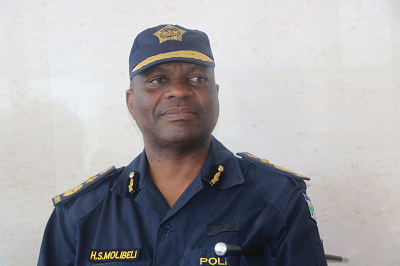By Thoboloko Nts’onyane
MASERU – The Chairperson of the Southern African Regional Police Chiefs Co-operation Organisation (SARPCCO), a police regional body, Leiutenant General (Lt-Gen) Joseph Shimweelao Shikango has commended the Lesotho Mountain Police Service (LMPS) following the recently conducted assessment and evaluation exercise.
The regional body responsible for promoting peace and security in the area has recently commended the Law Enforcement Agency for its exemplary efforts in maintaining law and order.
This he said last Thursday while tabling the preliminary report on the performance of LMPS ahead of the upcoming annual general meeting (AGM) for the SARPCCO.
As the executive of the SARPCCO, the Chairperson said they are happy with the National Central Bureau (NCB) Maseru adding that the latter is the best in terms of reporting and other NCBs could borrow a leaf from its book.
SARPCCO is among others charged with the responsibility to prevent and combat the Cross-border and Transnational Organised Crimes within the region. SARPCCO was established in 1995 in Zimbabwe.
Some of the priority crimes in the region that this body deals with include transnational organized crime, drug trafficking, counterfeit good and pharmaceuticals, proliferation of small arms and light weapons, trafficking in gold, diamonds and other precious medals, economic and financial crimes, crimes against women and children, environmental crimes and trafficking in persons.
This recognition highlights the LMPS efforts to maintain law and order while addressing crime in the country.
One of the notable aspects of the LMPS’s work is its emphasis on community engagement and proactive policing strategies. This has received support from the public for the impact it has had in arresting the high levels of crime rate within the communities.
Through community policing initiatives, the LMPS has succeeded in building bridges between law enforcement officers and residents, resulting in a safer and more secure environment. This is evident in the regular engagements with the communities for planning and strategizing and to an extent this move has helped enhance public confidence in the police service.
Lt-Gen Shikongo said the members of SARPCCO are also members of the International Criminal Police Organisation (Interpol). He said the members are required to implement the Interpol’s resolutions in their jurisdictions.
Interpol is an inter-governmental organization. It has a presence in 195 countries, and helps police in all of them to “work together to make the world a safer place”.
Asked which areas the LMPS is performing well on and those that needs improvement, the Chairperson who is also the Namibia Police Inspector General said the LMPS reports timely every time, a move which he said is commendable. He however said it should introduce the other international languages such as Portuguese, Arabic and French in order to meet the international standards of Interpol.
The oversight process lacked inclusivity as it solely engaged the Lesotho Mounted Police Service (LMPS) during the monitoring exercise. The media, civil society organizations, and other relevant stakeholders were not approached for their input and feedback regarding police operations.
Unfortunately, the police have gained a reputation for torturing and sometimes even killing suspects while in custody during their investigations. Consequently, numerous litigation cases have been filed by victims of police abuse, leading to the police losing many of these cases and having to pay compensation.
In a report sponsored by the American government that assessed human rights in Lesotho, the torture of civilians was highlighted as a significant violation perpetrated by law enforcement against the public.
Furthermore, the police institution faces challenges due to a lack of resources, resulting in slow response times to crimes. This shortage includes a scarcity of vehicles to promptly attend crime scenes.
In 2021, about 75 guns were reported missing in police custody and later some were found to have been used in the commission of crimes.
Meanwhile, the police institution is currently undergoing reforms as part of broader security reforms. These reforms aim to address both institutional and professional shortcomings that have plagued the police force. The overarching goal is to professionalize public institutions within the security sector.


